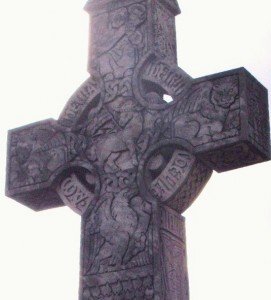DAY 76
I BIND MYSELF TO
THEE TODAY
ST. PATRICK’S DAY
Deuteronomy 30
& 31 and Mark 15:1-25
Today is St. Patrick’s Day, yesterday
our city of Albany had its parade. Many had too much to drink and I found
myself standing outside the Cathedral asking people not to use our lovely
building (with all its convenient columns to hide behind) as a toilet.
The one police officer and I threw in
the towel; I am now praying for a cleansing rain. I came in and opened to today’s
readings: both dramatic. As I am typing this there is still much noise around the
Cathedral. I knew this wasn’t what St. Patrick was about, but it did set me
thinking about him, and today’s readings.
In the Old Testament God says “today I
have set before you life and death, choose life.” Just like God to make it clear.
In the New Testament the terrible ordeal that Jesus must go through in order
for us to have life continues.
As I reflect on both passages I am
reminded of a Hymn; St. Patrick’s Breastplate. It is a favorite at ordinations.
While it is attributed to St. Patrick there is reason to believe it post-dates
his life. Regardless, it begins with the verse, “I bind unto myself today the
strong name of the Trinity” – in essence it says “I bind myself to life”. It is
a long hymn. Here is a link to it:
The second verse continues, “I bind
unto myself today…His death on the Cross for my salvation…” It is the verse
about Jesus’ life. I bind myself to Him today.
God is suggesting to the Israelites
today that they choose life. The Gospel presents that Jesus is Life and for us
to have life we must be “in Him”. We must, in the words of the hymn, bind ourselves
to Him who is Life. It doesn’t make what is taking place around the Cathedral
more acceptable, it does however help with perspective. I need to keep the big
picture. I need to make sure I stay bound to Him who is Life. I need to present
to others, even when unruly, the Man of Sorrows who died for them. This is in
fact what St. Patrick did in his life. He writes in his confession that he
considers himself uneducated – as I read his confession it does not seem to be the
case. Nevertheless his method was to be present with people as he himself was
bound to God.
It seems to me as Holy Week is
approaching, that binding myself to the Cross is yet again offered. It is not
at first blush pleasant. All the laws of the Old Testament at first blush don’t
seem pleasant either. Yet what awaits us is Life - choose life.






